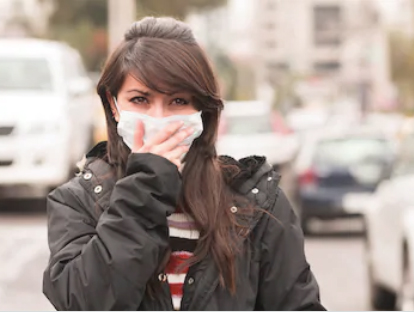

The air that you breathe has once again reached dangerous levels of pollution. People with no known respiratory issues are ending up getting admitted to hospital emergency rooms.
Nutritionist Avni Kaul says though the government does its bit to improve air quality and lower air pollution, you should look to introduce yourself to some natural antioxidant nutrients that can help your body counter with this onslaught.
The polluted air that you inhale introduces ozone, nitrogen dioxide, particulate matter, diesel exhaust particles into your lungs. The protective antioxidants available in the lining of your lungs fight it out until they are outnumbered, thereafter, the pollutants begin attacking the immune and body cells producing free radicals and causing inflammation. But do you know that antioxidants from the food you eat can give protection to your body from the harmful effects caused by air pollutants?
In this article, Nutritionist, Dietician and Founder of NutriActivania Avni Kaul tells about the foods that will help to build resistance against the effects of air pollution.
Vitamin C
Vitamin C is the single most powerful antioxidant for our body. This water-soluble vitamin is present throughout your body and it scavenges free radicals. Vitamin C also contributes to vitamin E regeneration. Sufficient vitamin C in your daily diets is vital for maintaining its level in the lungs. Adults need 40mg of this vitamin every day. Vegetables such as coriander leaves, chaulai ka saag, drumsticks, cabbage, and turnip greens are good sources that you should eat more. Also, you can include amla, guava, and lemon to supply yourself with a regular dose of vitamin C.
Vitamin E
You are least likely to be deficient in vitamin E, but it is a good idea to be aware of its importance if you are looking to increase your protection against air pollution. Vitamin E is fat-soluble, thus eating good quality dietary fats helps absorption. Oil sources of vitamin E, like the sunflower and safflower oils, are best for consumption. Also, almonds, sunflower seeds can provide you the essential nutrients of vitamin E.
Omega-3
Omega-3 fatty acids are known for the reduction of inflammation and oxidative stress caused by air pollution. They are also vital for brain and heart health, but several of us are not getting enough, as food sources are limited. If you do not eat a diet rich in Omega-3, you should consider a good quality supplement, especially if you are a vegan or vegetarian. Flaxseeds, chia seeds, walnuts, and canola oil are some of the sources of omega-3.
Beta Carotene
Dietary beta-carotene, present in red and orange fruits and vegetables as well as leafy greens, is changed to vitamin A in the body where it has anti-inflammatory and anti-ageing properties. Vitamin A is also vital for reproductive health, eye health and healthy functioning of the immune system. You can avail beta carotene from spinach, carrots, sweet potatoes and apricots.

Avni Kaul is a leading Dietitian & Nutritionist in Delhi NCR and the Founder of Nutri Activania. She holds a Master's Degree in Food and Nutrition from the University of Delhi and is a Certified Diabetes Educator from Project Hope and the International Diabetes Federation.
Her extensive experience includes serving as a Leicester Mamma's Ambassador, trained in Lactation Counselling with the NHS, United Kingdom.
Ms. Kaul specializes in key areas such as Infant and Young Child Feeding Practices, Pre- and Post-natal Diets, Fat Loss, Muscle Gain, and Holistic Health and Nutrition.